|
McCloud River Railroad
Equipment Roster Incentive Per Diem Boxcars |
|
|
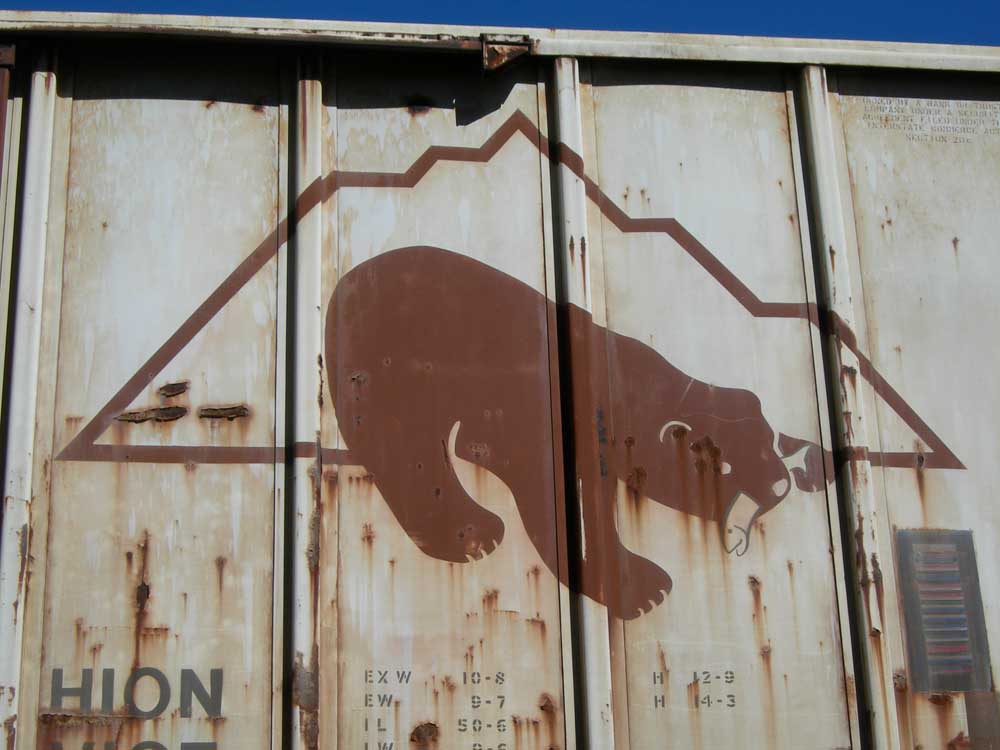
The logo as adapted for McCloud River's fleet of 405 Inecentive Per Diem boxcars. |
|
The McCloud River Railroad became well known to the railfan community in the 1970s for two primary reasons. The first was
the steam excursion program with the #25, followed shortly by 405 boxcars that spread the railroad's name and logo to all
parts of the North American continent. The railroad had investigated leasing or purchasing interchange freight cars at several points during its history, especially during years under U.S. Plywood ownership- for example, on 27 August 1965 McCloud president Flake Willis requested that the Western Pacific lease to McCloud one hundred 40' boxcars from their 20000 and 21000 series that would have been placed in service carrying US Plywood markings. The calculations changed substantially in the middle 1970s thanks to several factors. First was the generally poor financial shape of the railroad industry as a whole, which dried up dollars available for investments in new equipment. Second was the per diem rate structure then in place, meaning the amount of money a railroad pays the registered owner railroad of a railcar for the time the car spends on its tracks; these rates were set low enough for plain boxcars that revenues earned from per diem payments did not cover the cost of car ownership, which is the major factor that kept the McCloud River Railroad out of the car owning or leasing business prior to 1977. The rates also had the effect of driving the vast majority of new equipment investment towards specialized railcars that earned higher per diem revenues. One result of these factors was that the nation's boxcar fleet declined from 546,000 in 1964 to 372,000 in 1970, which quickly created a nationwide boxcar shortage, especially in the northeastern United States. Western railroads at the time still generated a lot of boxcar traffic destined for eastern markets, especially lumber, and as the shortage grew the eastern roads tended to keep boxcars from the west on their roads to handle their traffic. The disparity between car ownership costs and per diem revenues for boxcars in lumber service started to hurt the western roads; as an example, Southern Pacific in the early 1970s determined it was losing money on its California and Oregon lumber traffic, at the time one of the larger segments of its business, entirely because of low per diem revenues on its lumber cars trapped in the east. The growing problems and impacts to the national freight rail network the boxcar issue created prompted the Federal government to respond with two major incentives, first to significantly raise per diem rates on plain boxcars and second to create tax credits for those investing in new or rebuilt boxcars. Alert investment bankers and venture capitalists saw opportunity and commenced making substantial ivestments in new cars through several companies, principally Itel Rail and Brae Corporation. The hitch though was these companies had to act through railroads in order to access the per diem markets; Itel partially solved this by buying some railroads, including the McCloud River Railroad, but the vast majority of the new boxcars bought by the bankers would have to be leased to railroads. The boxcar owners found many willing ears in the world of shortline railroads and focused much of their marketing efforts on shortlines in the western United States that generated a lot of lumber loads, mostly under the working theory that all a shortline had to do was load a leased boxcar with lumber headed to and eastern market, as once there the boxcar would be kept busy in that region and earn substantial revenues for both the leasing shortline and boxcar owner. Thus was born what became known as the Shortline Boxcar Boom, when the nation's railroads were suddenly flooded with often brightly painted boxcars lettered for what had in many cases been obscure shortlines. Itel Rail completed its purchase of the McCloud River Railroad in early 1977. One of their first acts was to lease 405 new boxcars to the railroad for a period of 15 years. Railcar builder FMC built McCloud's new boxcars at their Portland, Oregon, plant in May and June 1977. Itel had 100 cars routed to McCloud for publicity shots and loading on the road while the remaining 300 cars were released from the plant directly into the nationwide railcar pool. The lease terms were fairly standard for pretty much all such boxcar leases between the owners and the leasing roads; in this case the McCloud River agreed to pay Itel the higher of the following two amounts: a. An annual per-car rental of $3,970 for the first five years, $3,590 for the second five years, and $3,210 for every year thereafter that the boxcars remained leased; OR, b. All revenues McCloud River earned on these cars if the aggregate fleet utilization averaged ninety percent or less. If the aggregate fleet utilization exceeded ninety percent, Itel would receive an amount equivalent to the base lease rate plus one-half of revenues earned in excess of the base rate. Both Itel and McCloud River Railroad initially earned good money off these boxcars for a few years, though Itel almost immediately subleased 250 of the cars to other shortlines. However, significant nationwide rail traffic declines associated with the recessionary years of the early 1980s and the loss of a lot of what had been boxcar traffic to either trucks or intermodal containers suppressed boxcar demand, and then the major railroads discovered that incentive per diem payments on all the new boxcars often exceeded the revenues they earned moving the loads they contained. Southern Pacific retaliated by implementing a $500 per carload surcharge against all loads carried in incentive per diem boxcars belonging to railroads not owned by any of their major shippers, and similar actions taken by other Class 1 carriers along with political activity quickly got the Federal government to end incentive per diem payments and abolish the tax shelters the cars had provided. Most lessee roads simply turned the cars back to the lessors. Thanks to traffic declines of its own the McCloud River had plenty of available yard, siding, and spur space to suddenly store the long lines of nearly new boxcars Itel owned that nobody wanted anymore, and McCloud's equipment roster swelled as these cars arrived on the property. The McCloud River Railroad thus became essentially a physical and paperwork dumping ground for Itel boxcars either between leases to other roads or waiting for new lease opportunities. Itel sold the rights to continue using the MR reporting marks to GE Capital along with the boxcars in 1991, and these rights and the remaining cars have since been resold to Wells Fargo. Several hundred boxcars remained stored on the McCloud Railway through the late 1990s and early 2000s, but in early 2006 GE sold all of them to Mandak Scrap Metals in Manitoba, Canada, who scrapped the cars and sent the steel to the nearby Gerdau Ameristeel rolling mill for recycling. By mid-summer 2006 only 17 boxcars GE Capital had conveyed to the McCloud Railway as partial payment for shop work remained in McCloud, and McCloud Railway cut the tops of most of them in 2008 to serve as gondolas during the scrapping of the railroad east of McCloud. The Williams Group in turn cut those cars up. At present only three incentive per diem boxcars remain intact on the McCloud Railway, with the body of a fourth on its side at Ash Creek Junction. A number of former McCloud cars from many of the groups outlined below are still in service but lettered for other roads, mostly Texas, Oklahoma & Eastern and Iowa Terminal. Roster 2000-2399: XM-class 50', double door boxcars, built May/June 1977 by FMC in Portland, OR. Purchased new by Itel Rail and leased to the McCloud River Railroad. A number of cars were lost in accidents, as follows: MR 2001 destroyed 2/1/78; MR 2002 destroyed 4/15/85; MR 2041 destroyed 8/4/79; MR 2146 destroyed 3/28/79; MR 2213 destroyed 9/12/86; MR 2227 destroyed 12/15/77; MR 2295 destroyed 11/3/78; MR 2322 destroyed 9/10/86; and MR 2394 destroyed 9/13/80. Series further thinned by three subleases in 1980, as follows: - 50 cars subleased 1/24/80 to Camino, Placerville, and Lake Tahoe Railroad, specifically MR #2245 to CPLT #7850; MR #2253 to CPLT #7858; MR #2260 to CPLT #7851; MR #2263 to CPLT #7852; MR #2264 to CPLT #7853; MR #2266 to CPLT #7854; MR #2267 to CPLT #7855; MR #2268 to CPLT #7856; MR #2273 to CPLT #7861; MR #2278 to CPLT #7857; MR #2281 to CPLT #7859; MR #2282 to CPLT #7860; MR #2283 to CPLT #7871; MR #2287 to CPLT #7878; MR #2289 to CPLT #7862; MR #2291 to CPLT #7863; MR #2297 to CPLT #7864; MR #2298 to CPLT #7865; MR #2299 to CPLT #7866; MR #2303 to CPLT #7867; MR #2306 to CPLT #7868; MR #2308 to CPLT #7869; MR #2311 to CPLT #7870; MR #2323 to CPLT #7872; MR #2327 to CPLT #7873; MR #2330 to CPLT #7874; MR #2332 to CPLT #7875; MR #2339 to CPLT #7876; MR #2340 to CPLT #7877; MR #2346 to CPLT #7879; MR #2349 to CPLT #7880; MR #2350 to CPLT #7881; MR #2351 to CPLT #7882; MR #2352 to CPLT #7883; MR #2354 to CPLT #7884; MR #2355 to CPLT #7885; MR #2358 to CPLT #7886; MR #2359 to CPLT #7887; MR #2360 to CPLT #7888; MR #2364 to CPLT #7889; MR #2365 to CPLT #7890; MR #2370 to CPLT #7891; MR #2373 to CPLT #7892; MR #2377 to CPLT #7893; MR #2379 to CPLT #7894; MR #2382 to CPLT #7895; MR #2383 to CPLT #7896; MR #2386 to CPLT #7897; MR #2387 to CPLT #7898; and MR #2390 to CPLT #7899 -100 cars subleased 2/6/80 to Seattle & North Coast (MR #s 2015, 2202, 2021, 2028, 2029, 2031, 2043, 2044, 2046, 2050, 2052, 2054, 2057, 2061, 2065, 2068, 2070, 2072, 2076, 2077, 2078, 2079, 2081, 2082, 2089, 2091, 2099, 2100, 2102, 2104, 2105, 2106, 2107, 2109, 2110, 2113, 2114, 2117, 2118, 2120, 2121, 2122, 2123, 2125, 2126, 2127, 2129, 2130, 2131, 2132, 2133, 2134, 2135, 2136, 2137, 2139, 2140, 2142, 2143, 2144, 2145, 2147, 2149, 2152, 2154, 2155, 2156, 2157, 2158, 2159, 2160, 2161, 2162, 2163, 2165, 2166, 2167, 2168, 2169, 2170, 2173, 2175, 2177, 2178, 2179, 2182, 2183, 2185, 2186, 2187, 2188, 2189, 2190, 2192, 2193, 2194, 2195, 2196, 2197, and 2199 to SNCT 1000-1099) -100 cars subleased 8/29/80 to Sierra Railroad (MR #s 2004, 2006, 2007, 2008, 2010, 2011, 2012, 2017, 2018, 2032, 2036, 2037, 2040, 2045, 2047, 2051, 2059, 2060, 2063, 2067, 2071, 2073, 2075, 2090, 2092, 2093, 2094, 2108, 2119, 2141, 2148, 2150, 2174, 2176, 2181, 2201, 2202, 2206, 2207, 2208, 2211, 2214, 2215, 2216, 2217, 2218, 2219, 2220, 2222, 2224, 2225, 2226, 2233, 2237, 2238, 2239, 2246, 2247, 2248, 2250, 2255, 2256, 2257, 2258, 2259, 2261, 2279, 2286, 2294, 2302, 2309, 2310, 2316, 2318, 2321, 2325, 2326, 2328, 2329, 2331, 2334, 2336, 2344, 2345, 2362, 2363, 2366, 2367, 2369, 2371, 2375, 2380, 2381, 2384, 2385, 2392, 2393, 2395, 2398, and 2399 to SERA 4500-4599). Cars in this series numbered 400 from 1977 through 1980; 149 cars in 1981; 144 cars 1984-1988; 139 cars 1989-1991; 97 cars in 1992-1993; 87 cars in 1994; 73 cars in 1996-2005; 34 cars in 2006; 6 cars in 2007; and 3 cars in 2008-2011. Ownership of the cars transferred to GE Railcar Services in 1991, with a handful of the cars subsequently conveyed to McCloud Railway as payment for shop work as outlined above. The McCloud Railway dismantled one of these cars around 2006, converting the body into two sheds around the shop area and the frame into a tender for crane #70. Some intact cars remain in service in 2020 but are registered to other railroads, including Iowa Terminal and Texas, Oklahoma & Eastern. 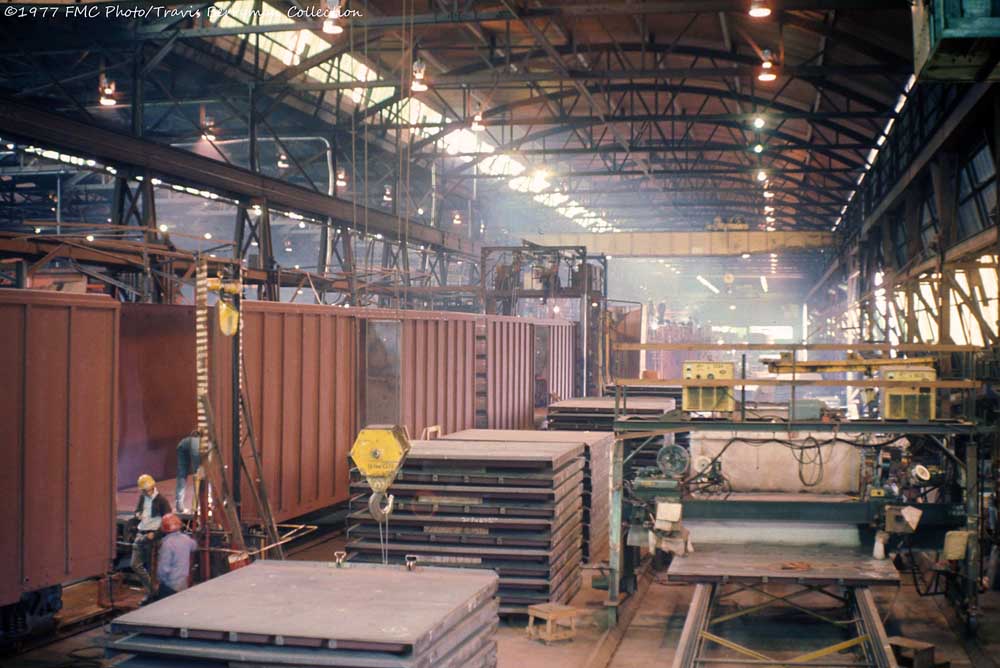 McCloud's boxcars under construction at FMC in Portland, Oregon. FMC photo, Travis Berryman collection.  Brand new McCloud River boxcars in Portland. FMC photo, Travis Berryman collection. 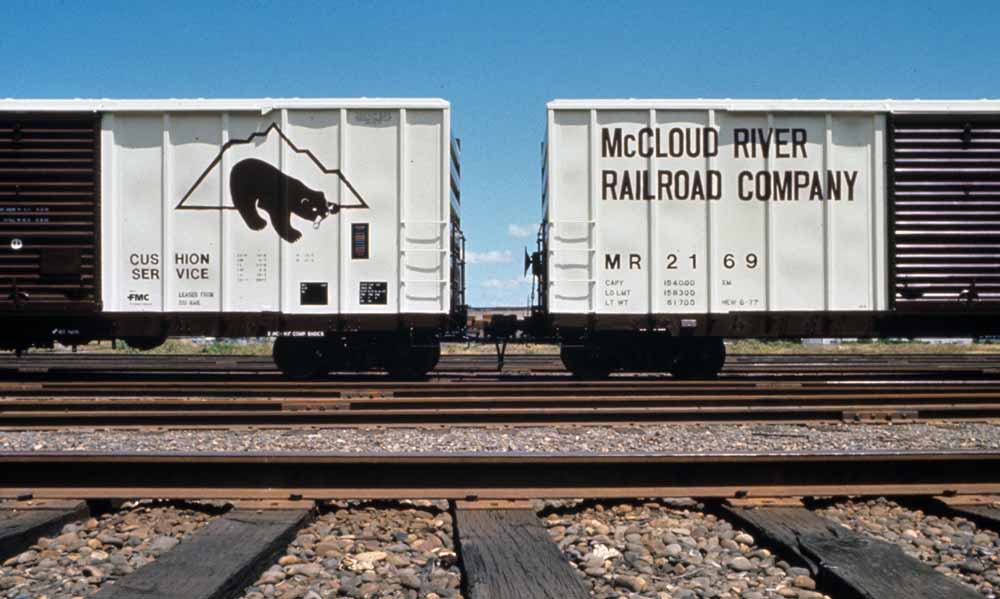 Another shot of new McCloud River boxcars. Itel photo, Travis Berryman collection.  First in the series, MR #2000, behind the shop. Pat Driscoll photo, Jeff Moore collection. 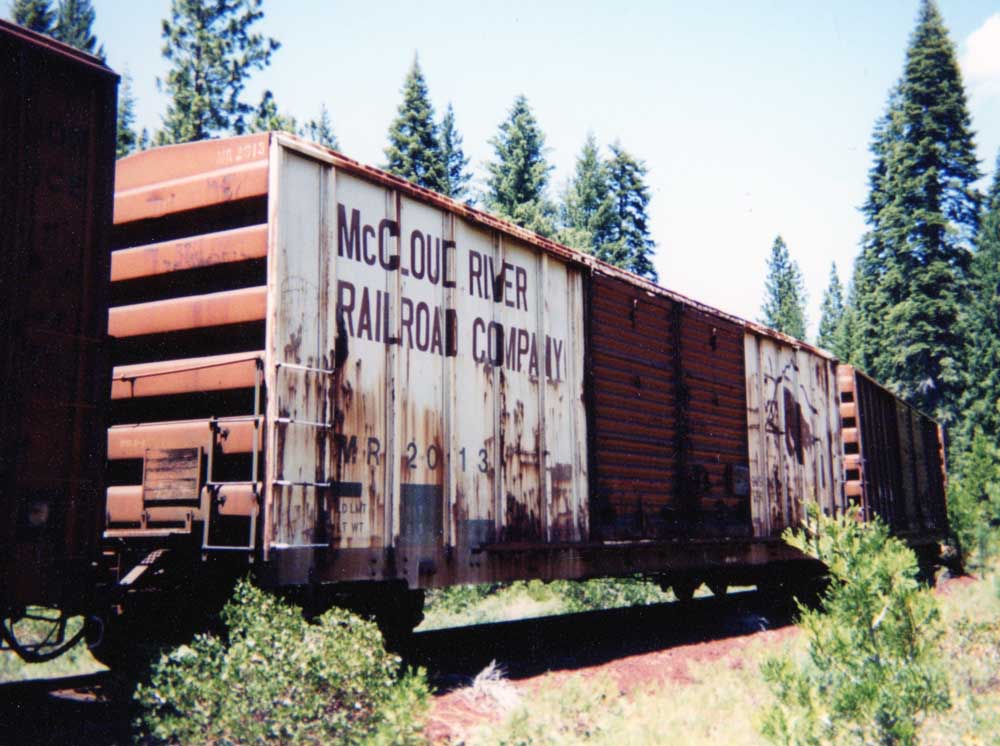
Almost every model railroad manufacturer offering steel boxcars seemed to release at least one in McCloud's scheme at one time or another. For many years the most accurate available
model was a Model Die Casting/Roundhouse car painted as MR #2013. The prototype for the car found on countless layouts is seen here on the Pondosa branch. Jeff Moore. 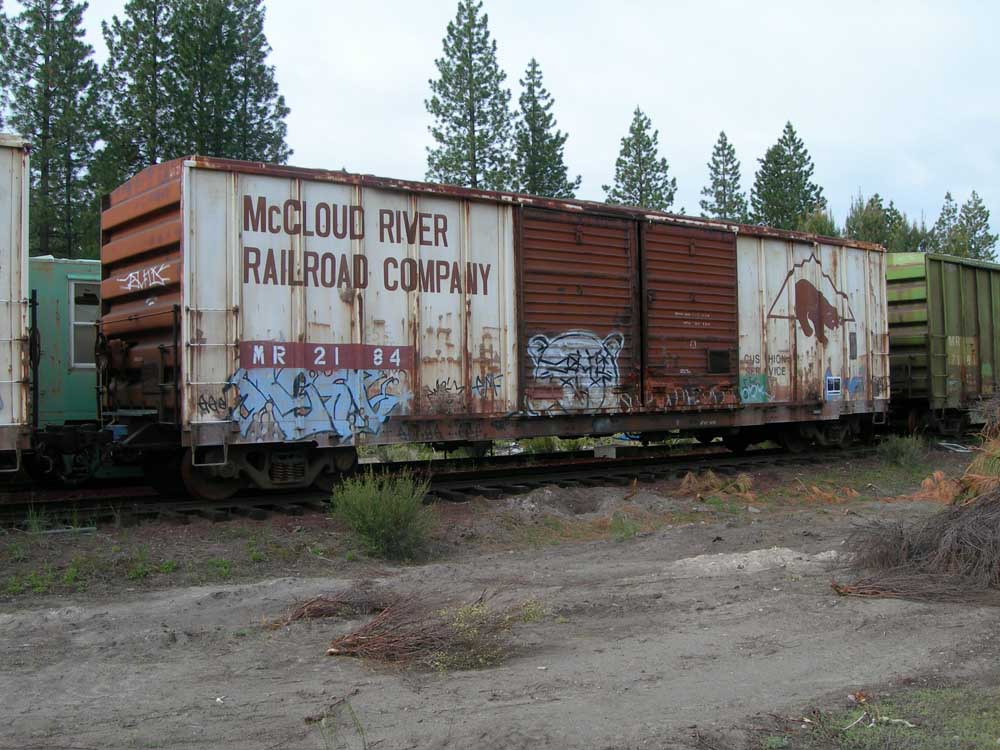 Boxcar #2184 at Ash Creek Junction. Jeff Moore. 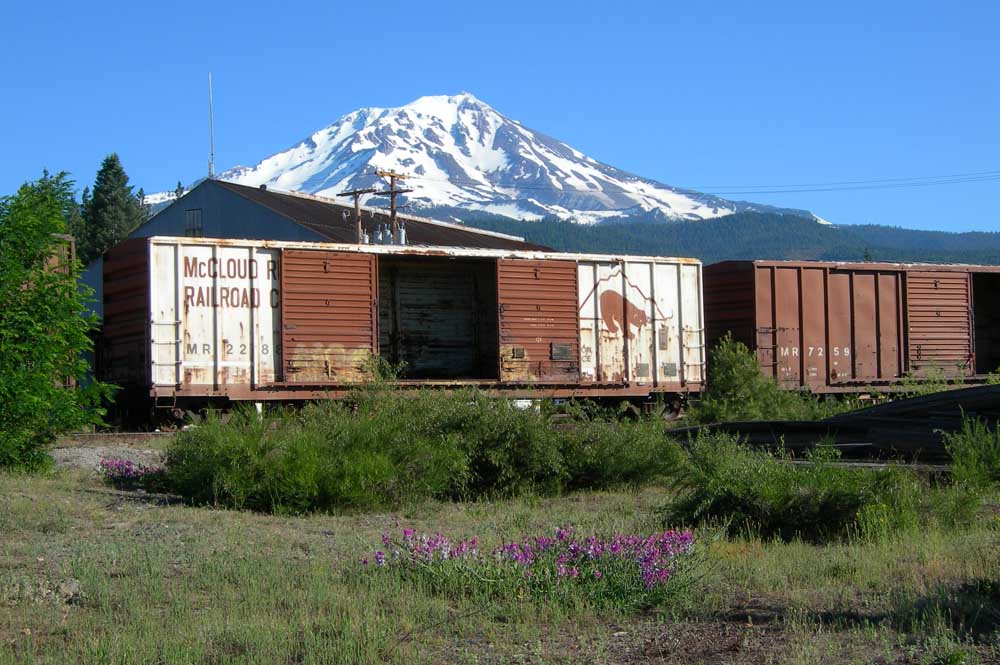 Car #2288 on its way off the property to the scrapper in June 2006. Jeff Moore.  A former McCloud River boxcar lettered for the Laurinburg & Southern in Wells, Nevada, on 17 February 2023. Jeff Moore.
2400-2405: XM-class 50', double door boxcars. Built 2/1978 by FMC for Itel and leased to McCloud River Railroad. Same description and disposition as cars in the
2000-2399 class. Cars in this series numbered 6 until 1991, 5 cars 1991-2005, 4 cars in 2006, and 2 cars in 2007.  #2400, first car in the second series of original McCloud cars. Pat Driscoll photo, Jeff Moore collection.
2500-2506: XM-class, 60-foot, single door boxcars. Leased 4/28/1983 from Itel. Cars stricken from
roster by 1988. 3000-3999: XM class, 50-foot, double door boxcars. Itel originally leased these cars to Arcata & Mad River; 95 cars in this series leased to McCloud River on 4/28/86. Lease terminated 7/21/1986.  AMR #1019 shortly after arriving in McCloud and before restinciling. Pat Driscoll photo, Jeff Moore collection.  A line of AMR boxcars in the McCloud yard. Pat Driscoll photo, Jeff Moore collection.  The AMR boxcars were a fixture on the Pondosa branch for several years in the middle 1980s. November 1985, Steve Moore photo.
4000-4098: XM class, 50-foot, double door boxcars. Itel leased 99 cars to be numbered in this series
to McCloud River on 4/20/83; however, Itel only delivered cars 4041, 4080, and 4084 before terminating
the lease for the remainder of the series. Car 4080 destroyed on 9/30/85; remaining two cars stricken
from roster in 2005. In 7/87 Itel leased a group of 45 boxcars that were to be numbered into this series,
but cars instead received MR 11125-11169. 4500-4599: XP, class 50-foot, double door boxcars. This fleet consisted of 100 cars originally from the MR 2000-2399 series subleased 8/29/80 to Sierra Railroad and renumbered SERA 4500-4599. Sierra terminated the sublease on 12/12/86, after which cars restored to McCloud roster with MR reporting marks and the Sierra numbers. McCloud River assigned these cars to Canadian National on 11/4/86. Cars in this series numbered 100 1988-1989; 99 cars in 1989; 98 cars in 1991; 97 cars in 1992; 95 cars in 1994; and 94 cars in 1996. No cars shown in this series 1997-2002, with 8 cars restored 2003-2005, 5 cars in 2006, and 4 cars 2007-2011.  Sierra #4521. Sierra only painted over the MR lettering, McCloud simply stenciled their reporting marks over the SERA lettering after getting the cars back. Jerry Lamper photo. 
Around the early 2000s a string of cars rolled on their own through the yard, with the #4566 coming to rest off the end of a yard track. Roger Titus photo.
7000-7275: XP and XM class, 50-foot, double door boxcars. Cars 7000-7176 (177 cars, formerly leased to
City of Prineville) leased 9/23/83 from Itel; cars 7177-7225 (49 cars, formerly leased to Camino,
Placerville & Lake Tahoe) leased 11/4/85 from Itel; and cars 7226-7275 were originally MR 2000-2399
series cars subleased 1/24/1980 to Camino, Placerville & Lake Tahoe Railroad (CPLT 7850-7899) and
returned 11/4/1985 to McCloud. Lease for cars 7187-7221 (35 cars) terminated 7/86. Cars in this series
numbered 132 in 1984, 276 cars 1986-1987, 243 cars in 1988, 240 cars in 1989; 237 cars in 1991, 137
cars in 1992, 70 cars in 1993, 66 cars in 1994, between 53-59 cars 1996-2000, 51 cars in 2001, 50 cars
2002-2005, 26 cars in 2006, 7 cars 2007-2009, and 6 cars 2010-2011. In the mid-1980s the railroad
placed two of the ex-CPLT boxcars on blocks, one for use as a storage shed behind the shop building
and the other at Cayton for use as a loading platform by Dicalite. One of the former COP cars conveyed in early 2000s to
the Yreka Western, who rebuilt into an open air excursion gondola; that car scrapped after 2008. 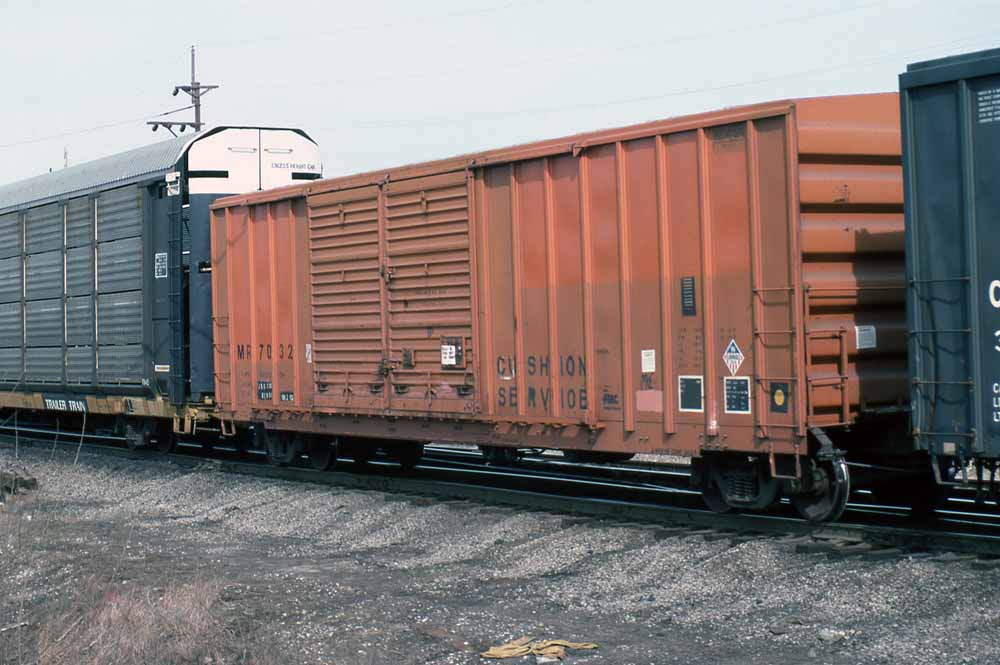 MR 7032, former City of Prineville, in East St. Louis in 1986. Jeff Moore collection.  MR 7059, former City of Prineville, in McCloud. Pat Driscoll photo, Jeff Moore collection.  MR 7089 getting some work done in the shop. Pat Driscoll photo, Jeff Moore collection.  MR 7127 in the McCloud yards. Pat Driscoll photo, Jeff Moore collection.  MR 7171, former City of Prineville, at Bear Flat, CA, in 2006.  MR 7175, former City of Prineville, at Bear Flat, CA, in 2003.  CPLT 7836 in McCloud in the middle 1980s. Pat Driscoll photo, Jeff Moore collection. 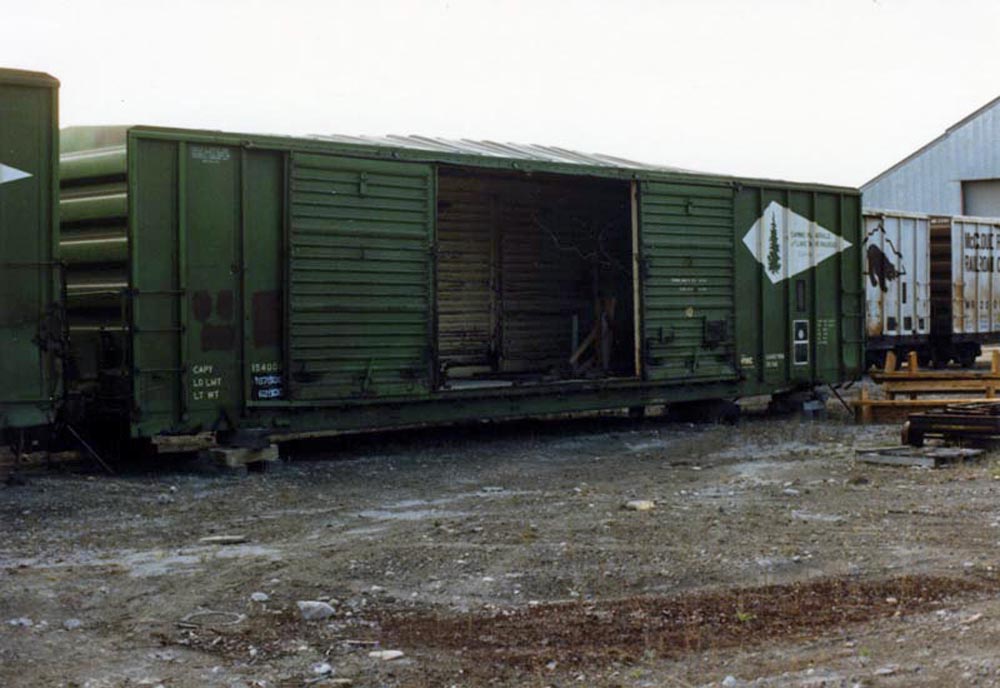 A former CPLT box set up as a shed behind the shop in the 1980s. Pat Driscoll photo, Jeff Moore collection. 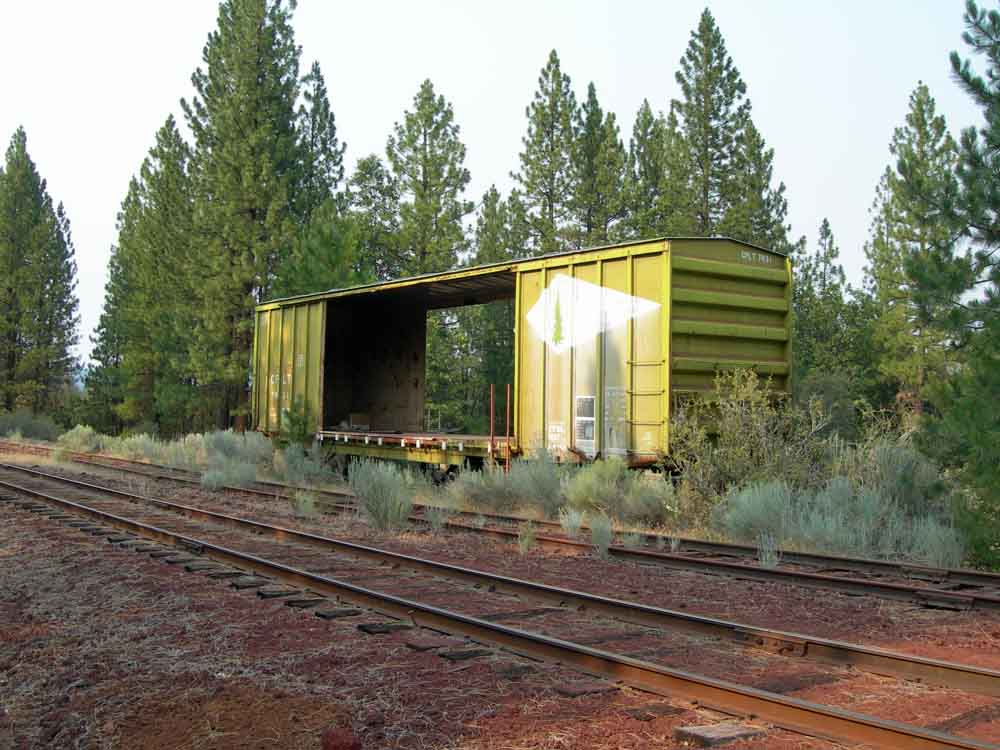 The former CPLT box set up as a loading dock at Cayton. Jeff Moore photo.
7700-7716: XP class, 60-foot, single door boxcars. 17 cars reported in 2001 only. 7800-7831: XP class, 60-foot, single door boxcars. 30 cars reported in 2001 only. 8000-8089: XM class, 50-foot, double door boxcars. Originally leased to Sierra Railroad. Leased 7/1/86 from Itel. Cars in this series numbered 88 1987-1989; 86 cars in 1991; 25 cars in 1992; 12 cars in 1993; 11 cars in 1994; 10 cars 1996-2005; and 4 cars in 2006.  One of the former Sierra boxcars in the McCloud yards. Pat Driscoll photo, Jeff Moore collection. 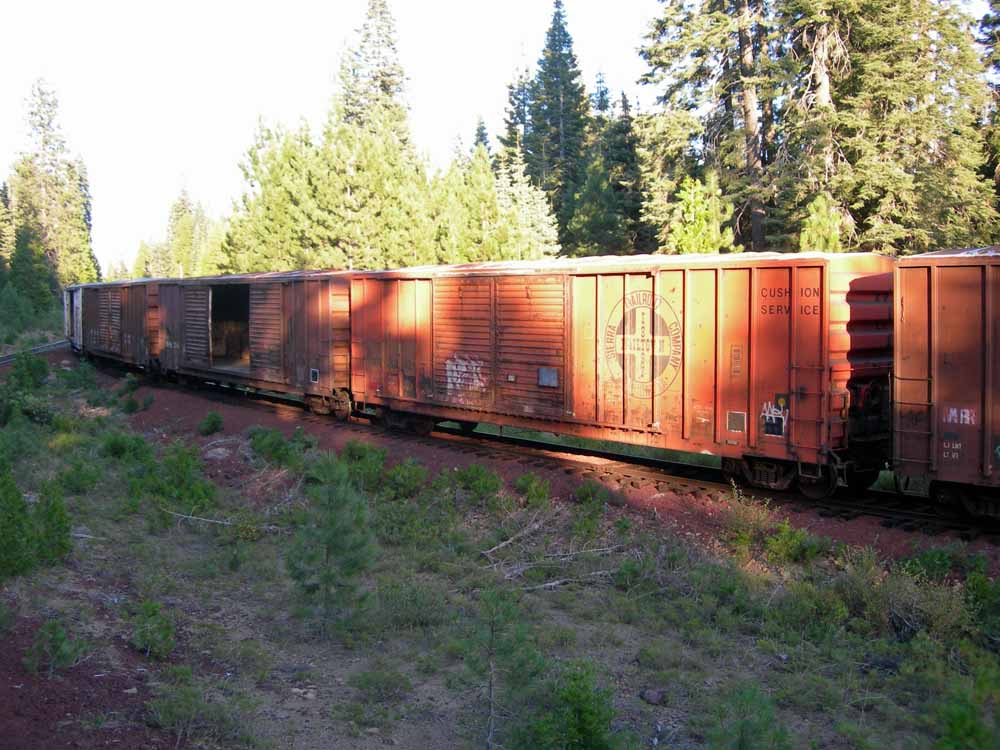 MR #8062 (ex-Sierra Railroad) in the siding at Pierce in August 2006 Jeff Moore photograph.
8700-8749: XM class, 50-foot, double door boxcars. Leased 7/1/86 from Itel. Cars in this series
numbered 35 in 1987; 34 cars 1988-1991; 8 cars in 1992; 4 cars in 1993; 3 cars in 1994; and 1 car
1996-2005.  MR #8713 showing definite Camino, Placerville & Lake Tahoe heritage at Black Butte. Pat Driscoll photo, Jeff Moore collection.  MR #8733 on 4 April 1987. Jeff Moore collection.
8750-8789: XM class, 50-foot, double door boxcars. Leased 1/87 from Itel. Cars in this series numbered
40 1987-1989, 39 cars in 1991, and 14 cars in 1992. 8790-8814: XM class, 50-foot, double door boxcars. 25 cars leased 1/87 from Itel. Cars re-numbered MR 11100-11124 by end of 1987. 11000-11099: XP class 50', double door boxcars. Originally McCloud River 2000-2399 series boxcars subleased 2/6/80 to Seattle & North Coast Railroad (SNCT 1000-1099). Cars repainted solid brown by McCloud shops prior to delivery. Cars restenciled 9/30/82 to MR 11000-11099 following modification of sublease terms. Sublease terminated 2/22/85 due to SNCT default and cars fully restored to McCloud roster. SNCT #1069 destroyed 9/17/84; SNCT #1074 destroyed 2/19/85; and MR #11084 destroyed 9/30/85. Cars in this series numbered 100 1984-1986; 98 cars in 1987; 97 cars in 1988-1989; 77 cars in 1991; 57 cars in 1992-1993; 54 cars in 1995; 45 cars in 1997-1999; 43 cars in 2000; 42 cars in 2001; 40 cars in 2002-2005; 26 cars in 2006; 7 cars in 2007-2008; and 6 cars in 2009-2011.  MR 11013. Pat Driscoll photo, Jeff Moore collection.  MR 11033. Pat Driscoll photo, Jeff Moore collection. 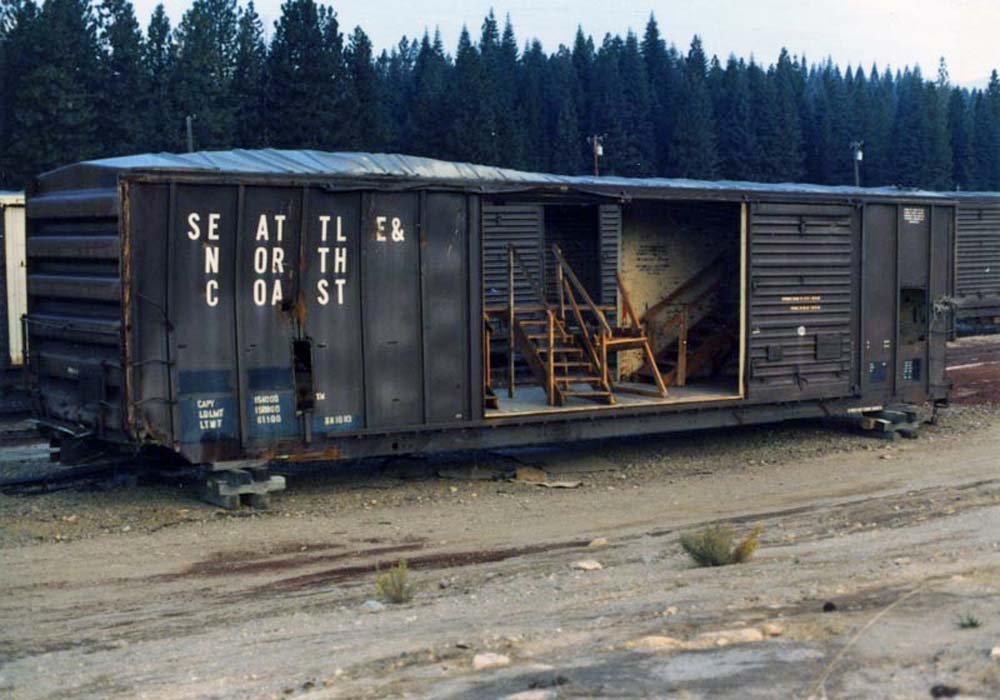 A damaged former SNCT boxcar storing steps used to get passengers on and off early 1980s excursion trains. Pat Driscoll photo, Jeff Moore collection.  MR 11061 in Madison, Wisconsin, on 9 March 1986. Jeff Moore collection.  MR 11072 at Bear Flat in 2003. Jeff Moore.  MR 11054 in McCloud. Jerry Lamper photo.  MR 11032 at Ash Creek Junction in 2007. Jeff Moore.
11100-11169: XP class 50', double door boxcars. Cars 11100-11124 originally MR 8750-8789, leased 1/1987 from Itel; Cars 11125-11169
originally Hartford & Slocomb #4000-#4099 series, to Ahnapee & Western 1978 (same numbers). H&S leased 25 cars to Crab Orchard & Egyptian (COER 1400-1424)
in 1984. McCloud River leased 45 of these cars from Itel in 7/1987 and originally intended to keep them in the 4000-series, but instead assigned them 11125-11169. It is
possible, though not confirmed, that MR 8790-8814 (11100-11124) may the old COER cars. McCloud River assigned these cars 7/1987 to Illinois Central Gulf. Cars in this
series numbered 70 1987-1989, 69 1991-1993, 68 cars in 1994, 67 cars in 1996, 66 cars 1997-1999, 64 cars 2000-2004, 12 cars in 2005, 11 cars 2006-2008, and 3 cars 2009-2011.
One car (MR #11138) sold to Modoc Railroad Academy, and others conveyed to Pee Dee River Railroad.  MR #11161 at Ash Creek Junction in June 2008. Jeff Moore photograph.
178882-178956: XP class, 50-foot, single door boxcars. Originally Soo Line cars. Itel leased the cars
to the Green Bay & Western on 5/10/1979. McCloud River subleased these cars from GB&W from
12/15/1986-1/1/92, at which time Itel leased the cars directly to McCloud River. McCloud River
immediately assigned the cars to Canadian National. Cars in this series numbered 75 1987-1994,
74 cars 1996-2003, and 72 cars 2004-2005. Remaining cars transferred to Golden Triangle Railroad
3100-series by 2006. |
|
|
Miscellaneous boxcar photographs
A healthy cut of the GE Capital boxcars starting their final journey in late April 2006.
Photo by and courtesy of John West.  As noted above, the McCloud Railway gained title to seventeen boxcars as partial payment for shop work the company did for GE Capital. The railroad cut six of the cars down to gondolas for help in the salvage efforts during the summer and fall of 2008. The cut down cars were stored in Ash Creek Junction until scrapped around 2012. |
|
|